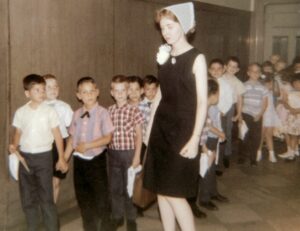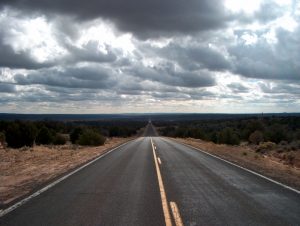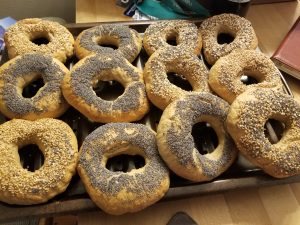Posts by Lisa Janice Cohen
There is nothing trivial about writing a novel. Regardless of the surface appearance of the story, its genre, its apparent complexity or simplicity, its length, or its intended audience, to create a story is to create a universe. And an act of creation is at its core, terrifying.
Writers are masters of ‘what if’, but when that what if gets turned on the creator, it can completely derail the process. What if it’s terrible? What if no one reads it? What if it doesn’t sell? What if no one likes it? What if no one likes me?
All of those questions come from a place of fear. And fear is the natural antagonist of the creative process.
I’m not going to tell you how to eradicate the fear. Even if that were possible (and I don’t believe it is), it would lead to stories that fail to engage and fail to touch the reader.
A story needs an antagonist of some kind (be it a person, a group, or a force). And so does the creative process itself. Just as the antagonist in any given story must be balanced with a strong protagonist, the fear of writing needs a foil in hope and joy.
That tension within a story is what builds drama and stakes. That tension within the creator brings the necessary spark to ignite the process itself.
Remember, the role of the antagonist is to challenge the protagonist. The simple dichotomy of hero and villain leads to the cartoonish antics of Dudley Do-Right and the mustache twirling Snidely Whiplash. This kind of entertainment is often briefly amusing, but is rarely more than that. There’s a reason craft books advise writers to create antagonists who are the lead characters of their own stories. They need to have the same strength of motivation and rich backstory to mine as your protagonist. This makes for stronger narratives and a more satisfying reader experience.
When you are the author, you are both protagonist and antagonist. Of course you are because you have created everything and everyone in your story from the power of your imagination and passion. But more than that, we are all our own best advocates and our own worst enemies. At the same time.
I believe it is this dichotomy that fuels us as writers. The process of making sense of the fear – understanding the backstory and motivations of your personal antagonist – is essential. It drives us to dig deeper and find the core truth at the heart of our stories.
In order to create, we must balance those oppositional forces, harnessing the hope to navigate the fear.
photo by Lisa Janice Cohen
I recently watched a documentary about Molly Kawahata, a young climate activist who is also an ice climber. It’s called The Scale of Hope. As she talked about the challenge of climbing a steep ice wall in Alaska, it felt as if she were talking to me about writing a novel. One of the things she says in the documentary is this:
“You don’t try to climb something that’s literally impossible. You have to know that you could get to the top.”
That’s hope. And yet, her time on […]
Read MoreI have finished a manuscript I’ve been working on for the past five years and now that it’s completed (multiple drafts, multiple revisions), I need to decide what comes next.
This is a decision I’ve been wrestling with for some time. Other WU blogposts have talked about the various ways to publish, and their pitfalls and opportunities. I’m going to go through my specific process and circumstances in the hopes that it will clarify the issue for me.
By the time this finds its way to Writer Unboxed, I hope to have make my decision.
My Writing and Publishing Background
I started writing novels around 2004 and in the 19 years since, have completed 14, and have an additional few either unfinished or abandoned. After querying for multiple books over the course of a few years, I found an agent to represent me in 2008. The first book she shopped didn’t get any real interest. The second received glowing rejections from many of the big publishing houses.
This was in 2011. Self-publishing was somewhat of a new thing then, and the agent agreed that it wouldn’t hurt for me to self-publish that book and see what happened while I was working on the next project.
I published it (THE BETWEEN) in 2012. It sold a modest number of copies and got some really wonderful reviews. I was happy with my experience and glad to see the story find readers. Not long after, my agent didn’t feel my subsequent manuscripts would sell and she stopped communicating with me. Ultimately, we parted ways a few years later.
Since then, I’ve published seven more novels under my own imprint including the sequel to that first book (YA portal fantasy), a standalone YA contemporary fantasy, and a series of five space opera novels. All have earned out their production expenses. Sales have ranged considerably by title from 500 copies to 16,000 copies. I often talk about luck and timing being a huge part of the publishing experience and I can honestly say that the book that sold 16,000 copies is not 32x better than the one that sold 500.
Why one book sells and another doesn’t is perplexing. I’m not sure anyone has the magical answer, because if they did, they would be able to hit a home run—AKA NYTimes best seller or similar status—every time. There are many indie authors who focus on marketing and promotion. I’m not one of them. To be honest, I’m basically allergic to self-promotion. I do very little other than try to be interesting and authentic when I do participate in social media and maintain an email newsletter that I send out about six times a year.
Could I do more? Yes. Will I? No.
It’s been five years since I’ve released a book and my backlist still sells about a book or two every day. I’m on track to earn between $1,000 and $1,500 from my writing this year.
The pros and cons for my current manuscript
This current manuscript is speculative fiction and as such, fits in with all my other novels genre-wise. However, it is more on the literary side than my more straightforward science fiction or fantasy novels.
Given the literary slant to this story, it may be a better fit for traditional publishing. […]
Read MoreI still vividly remember how we moved through the halls of our Elementary School for fire drills. In the back of my mind, I can hear the teachers reminding us: “Column of twos, holding hands,” as we marched outside to our class muster stations to wait for the all clear.
Because of the pandemic and the distance it placed between us, I needed to find a way to create a new kind of buddy system. One that was more personal than the larger writer gatherings that were happening on social media and video chat. One that would provide emotional support and motivation without guilt. One that was built on mutuality and trust.
I didn’t realize that’s what I was doing when a few of my writing friends organized a weekly meeting where we read and discussed writing craft books, sharing our responses to the books’ exercises when appropriate.
I didn’t realize that’s what I was doing when another group of writing friends – local in geography, but separated by circumstances – found a regular time online to share/grouse/emote about what was getting in the way of writing and recommending books to read.
I think I definitely understood what I was creating when I reached out to two different writer friends to organize separate weekly writing sprint times.
What I was weaving together was a safety net of sorts in the guise of a distributed accountability network. And even when I would show up to one of these meetings having not done my homework that week, my friends didn’t make me surrender my Writer Card. Over the nearly two years of this process, each of us has had our moments of struggle and doubt. Moments when the story felt wrong or trite or weak or simply beyond our skillsets. Sharing and acknowledging those feelings without value judgment allowed each of us to be honest with self and others to move forward.
I also learned a lot (and continue to learn) from the half-dozen or so craft books we have studied so far. No mater how long someone has been plying the writing craft, there is always something new to discover or something old to discover in a new way. Or sometimes, something to disagree with that offers fresh insight. And in discussing how a particular exercise either did or didn’t relate to my current novel in progress often led to significant breakthroughs. As did discussions of my fellow writers’ stories and story problems.
But I think I’ve made the most forward progress on the novel during the one on one writing sprint times.
Read More*Apologies to REM and to all of you for the earworm.
Sometime last winter, early in the days of the pandemic, I had a conversation with one of my oldest and dearest friends about how I was no longer ambitious about anything. It was a strange concept to be exploring and I couldn’t articulate all that I was feeling, but this I knew: I was exhausted. Something had to change. I was done with endless striving. Everything in my life had been pressure-driven, from excelling in college and graduate school, to succeeding in my profession as a physical therapist, to working to create and sustain a family, to fulfilling my dream of being a published author.
Imagine a road lined with mile markers; each one needing to be reached, counted, and passed, only to see the next one and the next one and the next one up ahead. Ambition can be the driving force of so much accomplishment. But it is also never satisfied. It had me convinced that there was a specific destination somewhere up ahead, a place those mile markers finally led to. I’m not sure what that place would look like, but I knew I’d recognize it when I got there.
Spoiler alert: there is no such place. It’s called a vanishing point for a reason.
My writing community knows I’ve been stalled on a new novel for several years now. This is the longest I’ve ever gone without finishing a work-in-progress since I began writing novels in 2004. I kept leaning into my long-ingrained habits and discipline. The words didn’t flow. I tried harder. I’ve let this project sit while working on other writing. Got a huge white board to diagram the story. Tried scene cards. Outlines. Freewriting. I’ve even been working with several zoom-based writing groups, exploring craft books, discussing process and doing writing exercises. And while I have poked away at the narrative all this time, I’ve made very little progress, despite believing in the story and the characters in it.
Ambition got me to where I had written thirteen novels in fourteen years and published eight of them over six years. Sure, ambition and its companions – sheer, unremitting stubbornness – can take you pretty far. But it comes with a price.
I’ve written before about how I haven’t been able to complete this story and while I’m frustrated, I haven’t been distressed. I think I finally understand why and it isn’t only what may seem obvious on the surface: that the sense of containing a universe in my head eluded me because there was far too much background noise, not to mention the anxiety brought to a fever pitch (pun intended!) by the pandemic.
The deeper answer came easily and fluently in a recent conversation with that same friend I talked about earlier. In this conversation, she confessed that when I had told her I was no longer ambitious, it didn’t square with how she saw me and she had been trying to sort it out ever since. And this was my reply:
Read MoreLong before COVID-19 brought its new and grim reality, I was already struggling with what it meant to be a writer who wasn’t writing. So maybe that’s why I haven’t experienced the kind of acute anxiety many of my fellow creators are experiencing now. For the majority of the past year and a half, I have been picking away at a manuscript, but not feeling as if I’ve been making any sort of true progress. What was strange was that I didn’t feel much (if any) distress about it. I could easily go weeks without looking at the story. When I did open the file, while I pretty much liked what I had written so far, knew the rough shape of where the story needed to go, believed in the story, I had absolutely no urgency to do the work to get it there.
In the seventeen years since I started writing my first novel, I never anticipated there would come a time where I wouldn’t be upset by not being able to write. (That’s quite the convoluted sentence!) But here I am. Not writing.
And because I have to worry about something, I am concerned that I’m not concerned. Does that mean I’m fine with never writing a story again? Have I run out of stories to tell? Am I really depressed but not aware of it? Does my subconscious mind think this story is worthless?
When I examine those questions, the answers are no, no, no, and no. But for right now, my creativity is taking me down different paths and that’s okay.
What I’ve come to understand is that being a writer is only a small part of being a creative soul. Words may be the main way I express myself, but they are only one way. I am also a potter, a gardener, a fiber artist, and a cook. Each of these fulfills a need in my life both to create and to nurture. I get the same pleasure from a friend using a bowl I’ve thrown that I do harvesting and turning peaches into jars of peach butter, knitting a sweater for my husband, or making a meal for a neighbor that I get from a good review or a letter from a reader.
The difference is that I’ve monetized my writing. And turning a creative pursuit into a business changes things.
After finishing the fifth and final book of my Halcyone Space series, I hit a wall. I had been working continuously telling these stories for over five years and my sense of wellbeing and creative self-worth became conflated with their commercial success. That metric can all too easily be a never-fulfilled hunger. No matter how many books you sell, there is always someone selling better, winning awards, getting rave reviews, and more.
I think it took me until now to fully understand how much my process and my expectations had changed when I shifted from writing stories to being an author. The past year and a half has taught me that I need to practice creativity without expectation of the outcome. Or rather, to let the process guide me in at least some kind of creative exploration.
Read MoreWe’re so glad to welcome back WU friend and Twitter team member L.J. Cohen today!
First, a caveat: this is not some best practices list or definitive expert advice; it is the experience of a single author over a brief and specific span of years. If something here resonates with you, that’s great. If it doesn’t, you aren’t doing anything wrong – your experience is simply different from mine.
If you peruse the writing how-to shelves, you will find book after book after book of guides. If there was a single way of doing this thing called writing, there would only be one text and we would all have it.
If I had a nickel for every time I heard “never edit as you write” or “no one is buying books about _____” or “you have to have an outline” or “just write a crappy first draft”, I’d have a heck of a lot of nickels and I wouldn’t need to be selling books to earn a living.
The thing is, people analyze their own process and experience and then apply causality to it. That’s a common fallacy after the fact: post hoc ergo propter hoc, Latin for ‘after this, therefore because of this.’ For example: Author notices that books which have more than fifty reviews are in general ranked higher than books that have fewer reviews. Author makes the assumption that having more than fifty reviews convinces Amazon to rank your books higher. What is likely happening is that more sales translates into more reviews (sales drive reviews, not the other way around) and it is the number of sales that primarily drives rankings.
I often say there is no secret sauce. Why? Because there is no secret sauce. Learn the process and method that works best for you for a particular project. And even then, don’t be afraid to try something else.
There’s a great scene in Monty Python’s Holy Grail movie where a king is talking about the castle he built in the middle of the swamp: “It sank into the swamp. So I built a second one. And that one sank into the swamp. So I built a third. That burned down, fell over, and then sank into the swamp. But the fourth one stayed up.”
There are many days where writing feels like building a castle in the middle of a swamp where the construction of logic you have built will burn down, fall over, and sink into the morass. But so much of the process – both of writing and of publishing – is finding ways to make the impossible and the untenable somehow work anyway. And it doesn’t happen without a lot of sinking into a lot of swamps.
It’s crucial to find a way to see this as part of your personal narrative. In 2009, I was signed by an agent. Over the next four and a half years, every project she shopped sank into the swamp. Three novels received glowing, personalized […]
Read MoreKath here. Many of you might recognize today’s guest poster, WU community member LJ Cohen. LJ is a poet and an aspiring YA novelist. She’s been with WU since our early days, and we’re thrilled to have her with us today. Enjoy!
‘Progo,’ Meg asked. ‘You memorized the names of all the stars – how many are there?’
‘How many? Great heavens, earthling. I haven’t the faintest idea.’
‘But you said your last assignment was to memorize the names of all of them.’
‘I did. All the stars in all the galaxies. And that’s a great many.’
‘But how many?’
‘What difference does it make? I know their names. I don’t know how many there are. It’s their names that matter.’
–from “A Wind in the Door” by Madeline L’Engle
I know the conventional wisdom. If you’re a writer, you need platform. Once that used to mean connections in a specific subject area for writers of non-fiction. Now it means the whole array of social networking for fiction writers as well. Honestly, you can’t turn around on the ‘net without some post or tweet exhorting the Power of Platform and of Harnessing Your Social Network to Sell Books. I swear, it’s starting to look like all those emails for Viagra.
I’ll admit it. I drank the social networking cool-aide. I began to have panic attacks when I didn’t get any retweets or blog comments on a given day. I began to feel like a failure at this whole platform thing. But, here’s the kicker: I don’t have a book to market (yet) and even if I did, hawking my wares online is no more my style than grabbing a soapbox and shouting about myself in the middle of the Boston Commons.
It’s not me. It will never be me. I’m an intensely private person. Surprise, surprise–a writer who is an introvert. I like long stretches of quiet alone time, time to think without distractions or background noise. Yes, I was that girl in elementary school who got in trouble for staring out the window during class. But I’m also no hermit. Nor am I ignorant about the need to self-promote to succeed in today’s publishing world.
Read MoreKath here. Please welcome Boston-based poet and novelist L.J. Cohen to Writer Unboxed. L.J. was a finalist in our quest to find an unpublished contributor. She’s been a part of the WU community for years, having contributed a two-part guest post for us in 2008 on using a wiki to organize a novel (see part one and part two). L.J. has been actively blogging at Once in a Blue Muse since 2005. She’s also the head moderator of a large internet based poetry workshop, Wild Poetry Forum. She’s been writing fiction for the past 5 ½ years, and has completed six novels. She is represented by Nephele Tempest of The Knight Agency and has a YA novel out on submission.
Enjoy!
Accentuate the Positive: Hope and the Aspiring Writer
As a yet-to-be-published writer, I have learned the necessity of keeping hope alive. Since writers are first and foremost daydreamers, it shouldn’t be difficult to hold to an image of my book shelved at the book store, or of a reader on the “T” looking up from one of my novels to recognize me from the back cover. Those are the dreams that keep me typing, writing scraps of ideas on scraps of paper, and pushing myself to do the umpteenth revision for my critique group.
And yet, hope can seem impossible, especially in a culture so obsessed with harsh realities and negativity.
So in the face of all the difficulties on the road to publication, how does a writer keep hope alive?
Read MoreBlogger and WU reader LJ Cohen has created an ingenious method of organizing information that’s embeddable into your wip — and not a post-it or scribbled napkin in sight — called TiddlyWikiWrite. In part one of her two-part series on TiddlyWikiWrite, Lisa described what a wiki was and how writers can use them to corral the mountains of information needed for a book. Part two shows us TiddlyWikiWrite in action. I can’t wait to give this one a whirl. Click the link to embiggen — Kath.
Examples of Use
1. Research
Tiddlers can easily hold information gleaned from books or websites, including live hyperlinks to URLs. (At its most basic, think of the Tiddlywiki as a digital repository for virtual index cards.)
It was much simpler to copy/paste the information into a tagged tiddler along with the URL for the source than to lose the bookmark amongst the hundreds of bookmarks in my firefox setup.
2. Character Development
I created a tiddler for each character (right), including physical description, role in his/her culture, connection to other characters (linked with wikiWords), history, motivation, etc.
This is a list of all the character tiddlers in my Heal Thyself wiki. It’s also helpful to see all my characters’ names in one list.
And this is the tiddler for my main female protagonist (left). Lilliane’s entry is not all that extensive, as I only did a minimal to moderate amount of pre-planning with this project. But even approaching this novel more like a ‘pantser’, I found using the wiki to be invaluable in keeping me on track.
Read MoreKath here. As part of my ongoing effort to find the perfect way to organize a mess when it comes to notes and research, I asked blogger Lisa Janice Cohen if she would share her organizing tool, TiddlyWikiWrite, and I was thrilled when she agreed. Lisa (left) created TiddlyWikiWrite out of an existing wiki platform (ingenious) into a tool that she calls a “virtual index card”. It seems simple enough for a luddite like me to use.
About Lisa: She lives in the western suburbs of Boston, MA with her husband, 2 sons, and assorted pets (currently one dog and one rat). When she’s not reading, writing, or editing, she’s a physical therapist. Lisa is also the head moderator of Wild Poetry Forum. She has recently completed her fourth novel and is actively querying for a literary agent. Her writing related blog can be found at: https://www.ljcbluemuse.blogspot.com/.
Enjoy!
Introduction
Most every writer will need some sort of organizational structure for writing a novel regardless of where you fall on the spectrum of plotter versus pantser. If you are a plotter, you write to a structured outline, with a significant and extensive amount of pre-planning. If you are a pantser, you let fingers fly on the keyboard in a gush of unfettered creativity. In reality, this dichotomy represents the two extreme ends of a spectrum and every writer uses some system to keep all the bits and pieces of a story together. There are likely as many ways to organize the writing of a novel as there are writers. If you are digitally inclined, a wiki is one technological solution to staying organized no matter what kind of writer you are.
Read More














